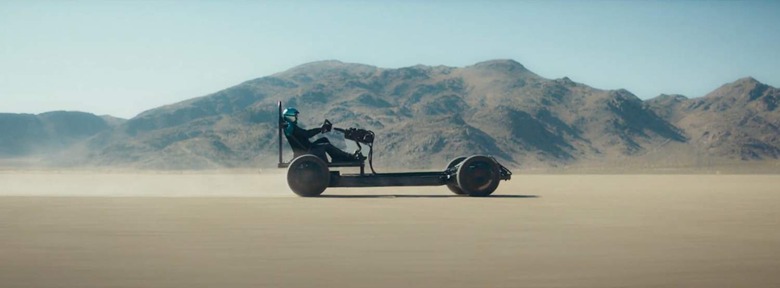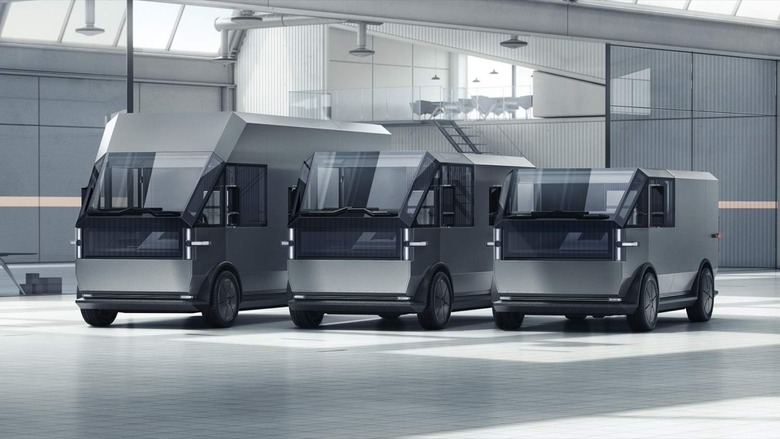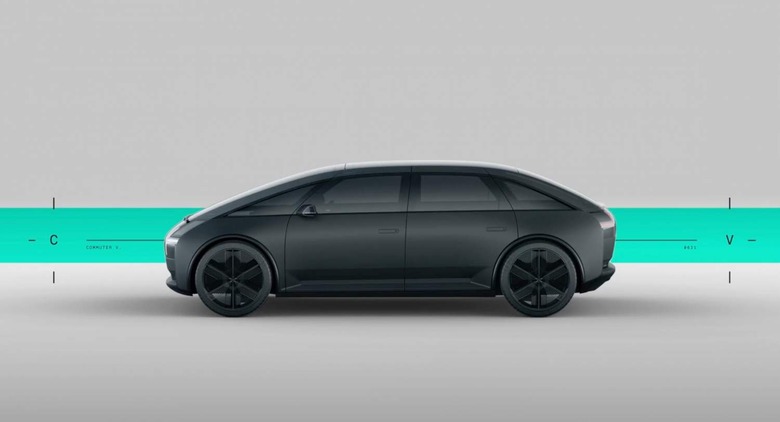Canoo's Ambitious EV Roadmap Is Counting On Clever Tech You Don't See
Canoo may not be a household name in electric vehicles like Tesla is, but that's not to say the startup isn't deserving of some attention. Making headlines this week with the Canoo Pickup, an unusually-designed truck that intentionally eschews the status-quo, the automaker now has three different EVs in its range, but hasn't started production on any of them.
Usually, that would be a recipe for incipient disaster. Canoo's argument is that while its trio of vehicles may look different, and serve very different markets, it's the similarities of what's underneath that counts. In fact, you could argue that the startup's whole point has been standardizing a single platform in order to unlock maximum flexibility.
The Canoo skateboard is the platform key
The automaker isn't alone in developing a modular platform for EVs. What sets Canoo's skateboard apart from others in the industry, though, is just how disconnected – mechanically, anyway – it is from the familiar controls inside. While from the driver's perspective the steering wheel and pedals may look normal, the way they're linked to what's going on at the asphalt is not.
It uses what's known as drive-by-wire: rather than a mechanical link between parts, there's an electronic one instead. In Canoo's case that's both steer-by-wire and brake-by-wire. Rather than turning a wheel and having that mechanical action join – via shafts, gears, and power-assistance – to the steering rack, you're basically telling an electric motor to swivel the wheels instead.
It's the same for the brakes. Your pressure on the brake pedal isn't actually physically linked to what the brake discs themselves are doing, instead using an electrical connection.
One platform, and you can sit anywhere
That has some significant advantages, when you're trying to use a single common platform for different styles of vehicle. Effectively, the driver's seat can be anywhere on Canoo's skateboard, and at any height. For the Canoo Pickup, that can mean higher up and close to the front, for maximum visibility.
If Canoo decides to build an electric sports car, however, it could position the driver further back and much lower. They could be seated in the middle, as in a McLaren F1, or the seat could even move from one side of the car to another. Combined with just how flat the skateboard is, that gives Canoo a whole lot of flexibility for just what sort of vehicle types it can build on top.

So far, for example, we've seen a minivan-style passenger vehicle good for up to seven people, and this week's pickup design. Canoo has also shown off its vision of an electric utility vehicle, a delivery van in a range of sizes and with varying range. That's intended for urban and suburban logistics.
Canoo's approach has caught big automaker attention
The rumored Apple acquisition that was reportedly in early discussions may not have panned out, but that doesn't mean Canoo hasn't caught the eye of other familiar names. Back in February 2020, Canoo and Hyundai announced they'd be collaborating on an all-electric platform for future electric vehicles.

That deal was part of the reason why SPAC Hennessy considered it worth of a merger. That finalized in December 2020, with the startup's listing on the NASDAQ helping raise capital to fund EV production.
Helping maximize that cash, there, is Canoo's big R&D and testing efficiencies. By building most of the safety architecture – and, for that matter, most of the more complex engineering – into the skateboard, you minimize the crash testing and development costs for each different vehicle you build upon it. At least, that's the promise.
For all the promise there are still plenty of Canoo questions
Plenty of startups have tried to make electric vehicles and follow Tesla's path to legitimacy. Many of them have struggled. Canoo may have backers, deals, and buzz, but it takes more than that to actually get into production.
One of the biggest questions is around pricing. Canoo plans to offer its minivan under a subscription plan, rather than outright sales, with flexibility for just how long drivers have the vehicle. For the Canoo MPDV – or Multi-Purpose Delivery Vehicle – meanwhile, it's aiming for a $33k starting price. That's aggressive, and it'll pit the automaker against familiar names in the category like Ford, which is bringing out its own all-electric Transit van too.
Canoo's current roadmap calls for the MPDV to go into production with limited availability in 2022. Scaled production and the proper launch, though, won't be until 2023. That's coincidentally the same year that it expects to begin pickup production too, which is more than ambitious.

For all the shared architecture – Canoo refers to its different body styles as "top hats" over the skateboard – it's unlikely to be as easy as just bolting different bodies onto an identical platform. With pickup reservations set to open in Q2 2021, it's unclear just how long preorder customers can really expect to be waiting for their EV. Still, if there's one lesson Tesla has taught would-be rivals, it's that with the right promises your customers can show an unexpectedly deep level of patience.
